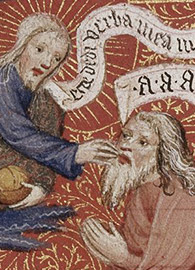Jeremiah Week 1
Are You Up to This?
Introduction

 Enlarge
Enlarge
Welcome to these Lectio studies on Jeremiah. Let me say at the outset that reading Jeremiah is hard. You may be tempted at various points to put it down and walk away. Don’t do it. If you stick this out, you will find out a great deal about yourself and your relationship to God. My prayer is that in reading Jeremiah, you will discover a complicated and richly textured picture of God’s relationship to Jeremiah and the people of God that will strengthen your own complicated and richly textured relationship with God. I hope you will gain new ways of thinking about and addressing God in prayer that will carry you through times that may become as dark as Jeremiah’s experience.
Those hopes and prayers can only be realized if you manage to make it through this difficult book. There are several reasons why Jeremiah is hard to work through. First, unlike the narratives of the Pentateuch or one of the Gospels, Jeremiah is not a narrative. There are episodes that are narrated, but these are few and far between. For the most part, Jeremiah delivers words from the LORD to the people of Judah and Jerusalem. These are offered in the context of Babylon’s sustained and ultimately successful aggression against Judah over an extended period of time. Hence, although Jeremiah is not a narrative, it does presume a certain context. Secondly, reading Jeremiah is difficult because it is repetitious. The LORD’s account of Judah’s sin and the judgment that is coming in the light of that sin are presented using a variety of images and allusions, but the upshot is always the same: Judah has abandoned the LORD, and the LORD is going to use Babylon to bring judgment and destruction upon Judah. Repentance is the only way to preserve the relationship between Judah and the LORD, but the people have repeatedly failed to change their ways. A third difficulty arises from the fact that Jeremiah’s account does not move sequentially through time. It is not a story that moves temporally from beginning to end. There is no narrative flow. A final difficulty resides in the nature of Jeremiah’s message. One feels deeply for the LORD who has been betrayed by the people of God; for the people who are about to face unimaginable horrors; and for Jeremiah, who loves both the LORD and the people, and whose vocation draws him deeply into this conflict at great personal cost. Nevertheless, God is covenantally bound to these people and will not—cannot—forsake them. Scattered throughout Jeremiah are promises of redemption and renewal.
While all of these are reasons why reading Jeremiah is difficult, none are reasons why Christians should not read Jeremiah. Jeremiah is part of Christian Scripture. The entirety of this Scripture has been given to us by God to lead us into ever deeper love of the triune God and our neighbors. Why would Christians willingly cut themselves off from one element of this great resource simply because it is difficult to read? There is no single formula to describe how reading Jeremiah will deepen our love of God and neighbor. This will happen differently for people in different times and contexts. The aim of each of these Lectio lessons is to offer comments that will make the texts under consideration clearer. In addition, I will try to raise up some of the theological matters that these texts engage, with the aim of helping Christians read this text in a way that deepens their love of God.
Loss and Hope
One way to look at Jeremiah is as a story about losing everything. By everything, I mean not only home, land, livelihood, place of worship, family, and friends. Jeremiah also relates the destruction of all of the mental, social, and spiritual foundations upon which the great majority of Israelites built their view of the world. Indeed, one of the things that becomes clear in Jeremiah is that the people of Judah are crippled by a set of presumptions about God. Their notions about the LORD’s nature, identity, and desires are so distorted that they can neither understand God nor themselves properly. This is what I mean by losing everything.
As I began writing these studies on Jeremiah, the news was filled with pictures of people fleeing their homeland, seeking a better life in Europe. Often pictures of these people poignantly reflect what Jeremiah describes: destruction, uprooting, disorienting loss, unrelenting grief. For Jeremiah and the people of Judah, behind the catastrophes they will face stands God. Although Jeremiah and others serve as God’s agents, it is God who ultimately plucks up, pulls down, destroys, and overthrows (Jeremiah 1:10). Most importantly, it is also God who will build and plant. In their state of loss, God is committed to building anew in Israel, to replacing rotted foundations with everlasting ones, to guaranteeing the hope and the assurance that, “All shall be well, and all shall be well, and all manner of thing shall be well” (Julian of Norwich).
The Setting of Jeremiah
The scholarly discussion about the composition of Jeremiah as well as the historical details of the prophet’s life are complex and shifting. I do not propose to deal with those matters here. I assume the great majority of you who use these studies will do so in conjunction with reading the final canonical form of the book in good English translations of the Bible. That is how almost all Christians in the U.S. engage this text.
Nevertheless, the text of Jeremiah does situate itself during the final days of the southern kingdom of Judah. The meteoric rise of the Babylonian empire under Nebuchadnezzar placed Judah in a precarious position. It lay between two superpowers, the Babylonians to the north and east, the Egyptians to the south and west. For those who remember, this is much like the way Finland used to be poised between the Soviet Union and NATO. Neither the Babylonians nor the Egyptians had that much interest in the small country. Its geographical location, however, made it seem politically imperative for Judah to maintain good relations with Egypt and Babylon. It often may have seemed politically prudent to play one of these powers off the other. Of course, all such alliances inevitably compromised Israel’s dependence on God, invited idolatrous practices, and injected a disastrous level of self–deception into Israel’s relationship with God.
The Call of Jeremiah
In Jeremiah 1:1–10, we read about God’s calling of Jeremiah. This call reveals God’s comprehensive involvement in Jeremiah’s life. God is the one who both calls Jeremiah and forms him in the womb. Moreover, God has appointed Jeremiah to be a “prophet to the nations.” There are strong parallels here to God’s call of Moses in Exodus 4. Like Moses, once God calls Jeremiah and commissions him to engage in a daunting work, Jeremiah resists. He thinks his relative youth and his lack of eloquence rule him out from the ministry to which God is calling him. As with Moses, God will not take “no” for an answer. The LORD immediately addresses the two impediments Jeremiah raised: youth and lack of eloquence. Strikingly, the LORD does not promise to make Jeremiah wiser than his years, to enhance his vocabulary, or to render him into a silver–tongued preacher. Instead, God simply promises to be with him and to deliver him. On the basis of this promise, Jeremiah is also told not to be afraid (Jeremiah 1:8). This promise reflects the LORD’s initial commitment to Abraham to “be God to you and your descendants” (Genesis 17:7), a promise reiterated to Jacob as he is about to leave the Promised Land (Genesis 28:15). It is also a promise that God makes to Moses in Exodus 3:12. It is the message the resurrected Christ gives to his followers when he commissions them to go to all the nations (Matthew 28:20). In the course of the book, it becomes clear that many of the actions of the leaders of Judah are driven by fear and the strong sense that God is either not with them or not paying attention to them. Here at the outset of God’s call of Jeremiah, the LORD addresses these two things by promising to be with Jeremiah to the end.
It will become clear over the course of Jeremiah that God’s promise to be with him does not always seem to be a blessing. As Jeremiah works obediently to speak whatever God commands him (Jeremiah 1:7), he often finds that such speaking puts him at odds with his own people and in conflict with the religious and political authorities. They plot against him, and his life is often in danger.
Only after promising to be with him and to deliver him does God touch Jeremiah’s mouth. While Moses was given Aaron to help him speak, God touches Jeremiah directly: “Now I have put my words in your mouth” (Jeremiah 1:9). God has given Jeremiah a daunting mission to oversee nations and kings. His work is both the work of judgment – plucking up, tearing down, destroying, and overthrowing – and the task of restoration – building up and planting.
The Promise and Peril of Prophecy
This is an interesting commission on several levels. One striking aspect of Jeremiah’s commission lies in a tension between verses 9 and 10. In Jeremiah 1:9, God puts words into Jeremiah’s mouth. This gives the impression that Jeremiah will be the vehicle for God’s speaking. That sounds very much like what we might expect from a prophet. A prophet is a messenger from God, someone who faithfully conveys God’s words to the people of God. Alternatively, Jeremiah 1:10 seems to imply that God establishes Jeremiah to perform a set of activities that seem much more appropriate for God. At first glance, it appears that Jeremiah is the one who will execute both the judgment and the restoration. Of course, as the text moves on, it is clear that the LORD is the agent who does all these things. Nevertheless, this blurring of the difference between Jeremiah’s actions and words and God’s actions and words touches on both the incredible promise and peril of prophecy.
On the one hand, the tasks of a prophet are so urgent and important for the life of the people of God, that it is crucial for the prophet to have the sort of intimate connection to God that renders the differences between God’s words and deeds and the prophet’s words and deeds inconsequential. On the other hand, if the prophet does not enjoy a deep and abiding intimacy with God, then the prophet has both the power and the opportunity to do great damage. There are numerous characters both in Jeremiah and in contemporary churches who seem happy to embrace the task of acting as both God’s voice and God’s hands. There seem to be few who have the requisite intimacy with God. Would-be prophets and those who listen to them must attentively discern the quality of the intimacy between God and the prophet. As in Jeremiah, when would-be prophets proclaim conflicting messages, the stakes for the people of God are high. This challenge of discerning true from false prophets is one that appears throughout the Old Testament. Unfortunately, the only guidance the Old Testament gives when it comes to discerning the difference between a true prophet and a pretender is that the words of the true prophet will prove to be true. Most believers will need to make a decision before then.
This unfortunate situation becomes more problematic when one recognizes that one of the charges prophets such as Jeremiah most often lay at the feet of the people of God is that their various sins have rendered them blind and deaf when it comes to hearing and discerning the import of the word of God. Thus, there is a deep irony built into prophecy. When the people of God most need to discern and listen to the words of a true prophet, their sin has made them unlikely to be able to do just that. It is far better to never need the voice of the prophet than to be in the position of having to discern a true from a false prophet.
Jeremiah’s Visions: The Almond Branch and the Boiling Pot

 Enlarge
Enlarge
Jeremiah 1:11–19 conveys to us Jeremiah’s first words from the LORD. The LORD shows Jeremiah two visions. The first vision is of an almond branch. This vision leads to God’s assertion that, “I am watching to see that my word is fulfilled.” The connection between the vision and the assertion may not be immediately clear. In Hebrew, these verses contain a wordplay on shaqed (almond) and shoqed (watching). The wordplay makes the connection that is not so clear in English: The LORD reveals that the significance of Jeremiah’s brief vision is to confirm that the LORD’s word will happen as the LORD says.
The second vision announces the judgment that is to come upon those who “dwell in the land.”
The LORD is going to use these powers from the north to bring judgment on Judah and Jerusalem. The people of God have abandoned the LORD and lapsed into idolatry, worshipping the works of their own hands as if they were gods. The account of idolatry rendered here indicates that it is primarily a foolish act. The people of Judah should know that anything fabricated by a human cannot be a god. This is a familiar criticism of idolatry.
In response to Judah’s idolatry, the LORD is going to use idol-worshipping nations to bring judgment on them. Stated this way, one can begin to see how hard it might be for the people of God to think that these invaders could be instruments of God’s judgment. In their eyes, the LORD who hates and rejects Judah’s idolatry would equally abhor Babylon’s idolatry. Yet this is the substance of Jeremiah’s message. The LORD’s attachments to Judah are so deep and abiding that the LORD is willing to work through a pagan nation to bring Judah to her senses.
At the same time, the LORD is aware that this is an astounding message to send through Jeremiah. Nevertheless, the LORD commands Jeremiah to be resolute, to relate the entirety of this message to the people of Judah. This message will take Jeremiah to the brink of his personal, emotional, and social resources. God does not promise to make this easy. Indeed, the LORD seems to assume that Jeremiah’s mission will be extremely stressful. But God promises to sustain him. In Jeremiah 1:18, God promises to make Jeremiah, “a fortified city, an iron pillar, and a bronze wall.” These are the very characteristics that the people of Judah will expect of Jerusalem, God’s own city. Instead, they are the characteristics of the prophet through whom God announces judgment on Jerusalem and her leaders.
These leaders will resist and reject Jeremiah’s message. They will plot against Jeremiah and seek to kill him. In the same breath that God commands Jeremiah to persevere amidst this opposition, God is committed to sustaining and defending Jeremiah. It is appropriate then, that just as in Jeremiah 1:8, this section closes with God’s promise to be with Jeremiah and to deliver him. As we will see, Jeremiah may not always welcome God’s abiding presence, but it is always there. The trick is learning to be able to see and welcome this presence even when it is not necessarily comforting.
Questions for Further Reflection
- How does the call of Jeremiah remind you of other call narratives in Scripture (e.g., Abraham, Moses, Gideon, Isaiah)? How does Jeremiah’s call differ from the others?
- Why does Jeremiah resist God’s call? Do you think Jeremiah’s concern is legitimate? How does God respond to Jeremiah?
- What does God promise to Jeremiah in chapter 1? Do you think this is a comforting promise? Why might “God’s abiding presence” not be a comfort to Jeremiah?
Back to Jeremiah Next Lectio>>

This work is licensed under a Creative Commons License.




